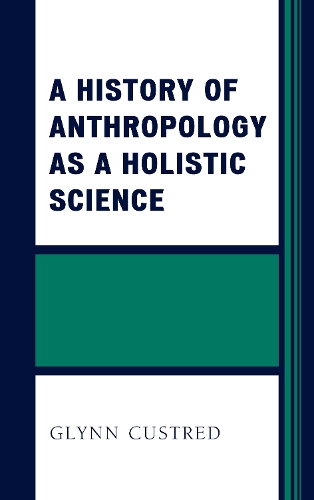
A History of Anthropology as a Holistic Science
(Hardback)
Available Formats
Publishing Details
A History of Anthropology as a Holistic Science
By (Author) Glynn Custred
Bloomsbury Publishing PLC
Lexington Books
27th April 2016
United States
Classifications
Professional and Scholarly
Non Fiction
Social and cultural history
History of the Americas
Western philosophy from c 1800
History of science
Anthropology
Sociology
301.01
Physical Properties
Hardback
268
Width 162mm, Height 238mm, Spine 25mm
576g
Description
A History of Anthropology as a Holistic Science defends the holistic scientific approach by examining its history, which is in part a story of adventure, and its sound philosophical foundation. It shows that activism and the holistic scientific approach need not compete with one another. This book discusses how anthropology developed in the nineteenth century during what has been called the Second Scientific Revolution. It emerged in the United States in its holistic four field form from the confluence of four lines of inquiry: the British, the French, the German, and the American. As the discipline grew and became more specialized, a tendency of divergence set in that weakened its holistic appeal. Beginning in the 1960s a new movement arose within the discipline which called for abandoning science as anthropologys mission in order to convert into an instrument of social change; a redefinition which weakens its effectiveness as a way of understanding humankind, and which threatens to discredit the discipline.
Reviews
This is a deeply 'foursquare,' unoriginal history of the discipline of four field American anthropology, from its rise in the 19th century to its intellectual climax from the mid through the late 20th century. This straightforwardness defines the book's primary usefulness as a teaching tool in introductory courses. Regardless of personal passion or version of the telling of American anthropology's history in terms of current stakes, teachers can easily work with this text with its clear prose and coverage of physical anthropology, archaeology, sociocultural anthropology, linguistic anthropology, culture areas, and holism. Deeply imbued with a certain historical faith and pleasure in the discipline, the bookblessedly refrains from being too preachy or annoyed with recent 'turns.' The discipline as a whole has given what Custred has needed to be a first-rate Andeanist. But what of the many anthropologists today who define themselves outside the traditional 'culture areas' They can still learn much from thisbook. Summing Up: Recommended. All levels/libraries. * CHOICE *
The book is highly readable and clearly argued, offering broad coverage of a plethora of authors, theories, schools, and fieldwork in four national traditions.... I found Glynn Custreds book both enjoyable and provocative.... [H]is history of the holistic ideal in anthropology is...a welcome contribution to the reflexive awareness of the historicity and theory-laden character of knowledge, an awareness which is essential to the anthropologistss training and trade. As a plea for the holistic ideal the book also constitutes relevant early 21st-century source material for epistemological analysis itself. * Anthropos *
Custred provides a remarkably broad and deep history of anthropology. In response to those who call for a split between the traditional four-fields of anthropology, Custred demonstrates that, from its very beginnings, the most important anthropology has been done by scholars who practiced in a four-field framework. Custred shows that even some of the more humanistically-oriented anthropologists have made the argument that anthropology must be a holistic discipline. It is a strong work, and deserves a prominent place in courses on the history of anthropology. -- Peter Peregrine, Lawrence University
It is with commendable clarity and economy of exposition that this work encompasses anthropology's unique eclectic character and far-reaching breadth of focus. The author's purview ranges from the discipline's roots in European intellectual thought and the Second Scientific Revolution to its contemporary topical and theoretical diversity. Drawing on his own field research in the highlands of Peru, Dr. Custred provides the reader with a tangible sense of immediacy and a vivid and intimate example of the ethnographic experience. -- Andrei Simic, University of Southern California
In a time when the theoretical and mythological approaches in anthropology appear to have the aim of fragmenting anthropology, Glynn Custreds A History of Anthropology as a Holistic Science traces the epistemological history of holism that binds anthropology as one discipline. -- Douglas W. Hume, Northern Kentucky University; Treasurer, Society for Anthropological Sciences
Author Bio
Glynn Custred is professor emeritus of anthropology at California State University, East Bay.
